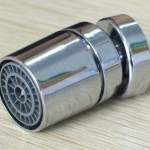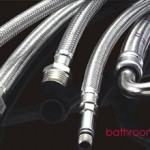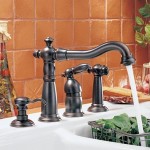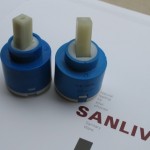How to Fix or Repair a noisy kitchen or bathroom sink faucet? Troubleshooting water faucet noise online! If you’ve got a kitchen faucet or bathroom sink faucet at home that makes a lot of noise then you know how annoying it can be. I used to hate washing dishes because I couldn’t even carry on a conversation with my wife over the shrill whine that erupted from the kitchen faucet every time the water ran. But I fixed it! It seems that the primary source of noise in a faucet is the aerator, numbered “1” in the diagram below.
最初, unscrew the faucet aerator and check it for mineral deposits. Removing debris will often eliminate a great deal of noise. Try running the faucet without the aerator to hear if the noise goes away. そうでない場合, then your problem is something else. Screw the newly-cleaned aerator back on and check if the noise returns. If so, buy a new aerator from Sanliv Sanitary Ware for 30 cents.
My experience has been that 95% of the time a drop in water pressure is seen in a faucet which is not accompanied by a drop in pressure elsewhere, the aerator is the culprit. A restricted aerator is not as common a cause of faucet noise as a worn out out washer… unless you’ve got a washerless faucet.
Let us go deep about plumbing noises, most specifically water hammer. Water hammer is that thunking, clunking, clanging noise you get when you turn a faucet off or the washing machine switches cycles. Plumbing can make many weird noises which can have many causes and; sometimes, they’re not easy to isolate and fix. The following are some of the common issues.
1. Water hammer. This noise doesn’t happen with flowing water, so if it occurs while your water is running, it isn’t water hammer. As I mentioned at the beginning of this article water hammer happens when you turn OFF a water suddenly. Shutting off the water suddenly sends a pressure or shock wave down the water line through the water shocking the pipes and creating the hammer noise. These shock waves travel faster than the speed of sound and can exert very instant pressure. Over an extended time, water hammer can damage pipes, valves and eventually weaken pipe joints. This may in itself cause additional problems as in #6. Most newer homes have devices called hammer arresters that are air filled chambers connected to the plumbing that let the pressure wave dissipate harmlessly into a cushion of air. These arrestors can become filled with water and stopworking. If the banging in your home has been happening forever you may not have one. To correct this you must drain your house of all the water in the pipes.. Turn off your water to the house at the main shut off valve or at the meter. Find the lowest faucet in your house, often this is an outdoor hose faucet, and open it. Then open the faucets that is in the highest place in the house. Let the low faucet drain for 5 minutes or until it stops dripping, whichever takes longer. Close all the faucets and turn the main back on. When you turn the water back on the pipes will have air in them and will sputter until this air is dissipated don’t panic.
2. Faulty toilet fill valve (ballcock) will cause resonance sounds like a fog horn or a moan. It’s easy to check. Close the supply valves to all the toilets. If the noise disappears, open them one-by-one till the noise starts again. Replace the ballcock in that toilet. If there are no shut-offs handy, sometimes you can locate the faulty ballcock by lifting up on the float ball while someone turns on the faucet that is causing the noise.
3. Bad faucet washer. If your nosie only happens when using a certain faucet the faucet washer may be loose or damaged. This can cause it to flutter in the water stream causing various sounds To repair this tighten the screw to the washer in the faucet stem. If this doesn’t work, then it’s time for a new stem assembly. If your dishwasher or washing machine is causing the noise you may have a worn out solenoid fill valve.
4. High water pressure can cause a variety of problems including these noises. It can also damage toilet valves and other devices connected to the plumbing. I saw an issue on a forum last week where water pressure was cited as the cause for a hand held shower hose coming loose. If you’re on a water system, ask your neighbors if they are having similar problems or simply call your water supplier and ask that they come out and check your pressure settings. If you have a well you should have a water pressure meter. If the pressure is above 60psi you may want to adjust your pressure reducer
5. Pipes rubbing or bumping inside the walls because they aren’t strapped down well or because the stud pass through holes are too small or off center. If this is the case they’ve probably made the sounds since the house was built.. If this is the problem you will have to call a plumber to make the repair. This can be far too complicated for the average homeowner/do-it-yourselfer to handle.
6. Pressure regulator. If you have a pressure regulator on your main water line it may be faulty. If your pounding sound happens while the water’s running, it happens at more than one faucet, turning on other faucets changes the cadence, the pressure changes with the pounding, While the noise is happening, check to see if it is coming from the regulator. If so, the regulator may need to be replaced.
I hope this information has helped you track down your plumbing noises and given you enough info to effect a repair yourself, or better yet I hope you get a new job which takes your mind off the issue and gives you the money to pay someone to come and fix it.






